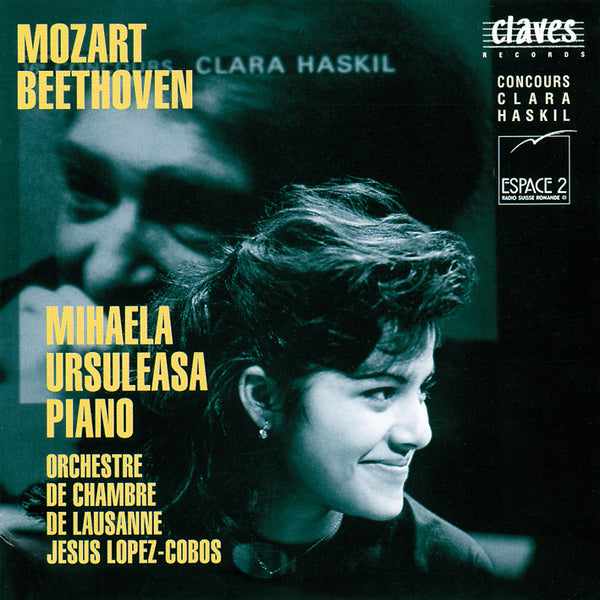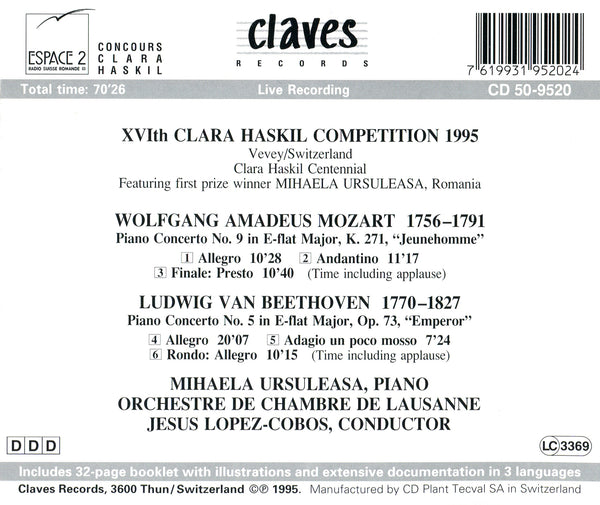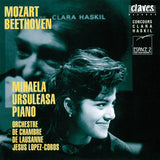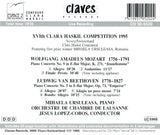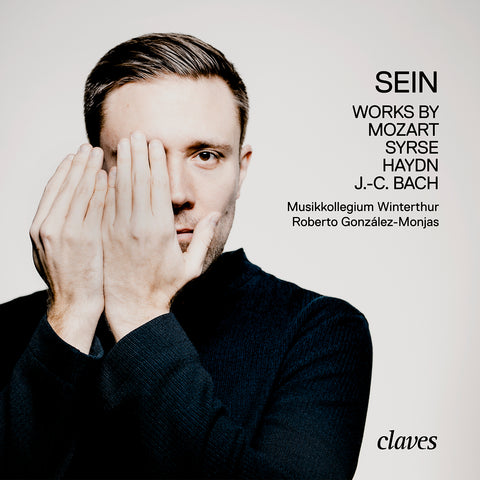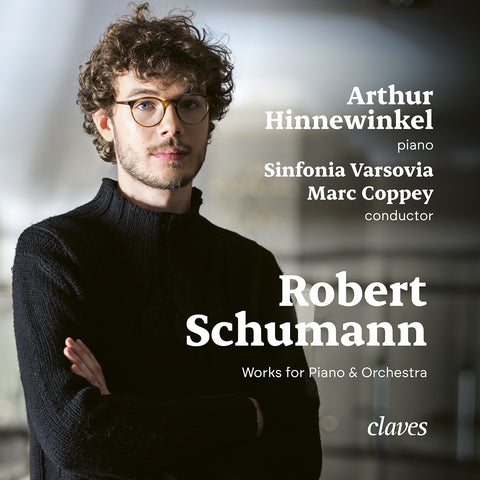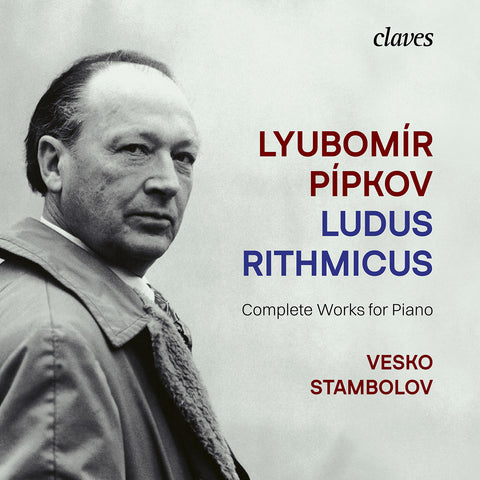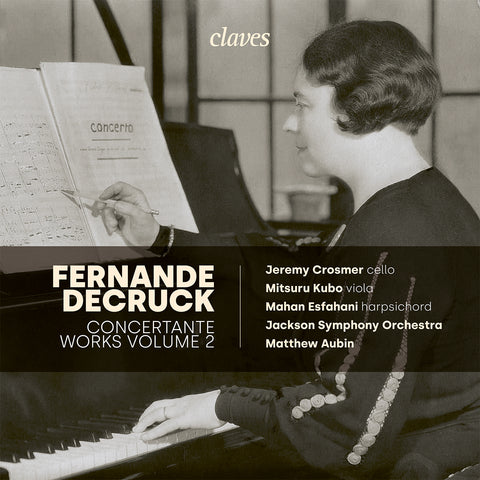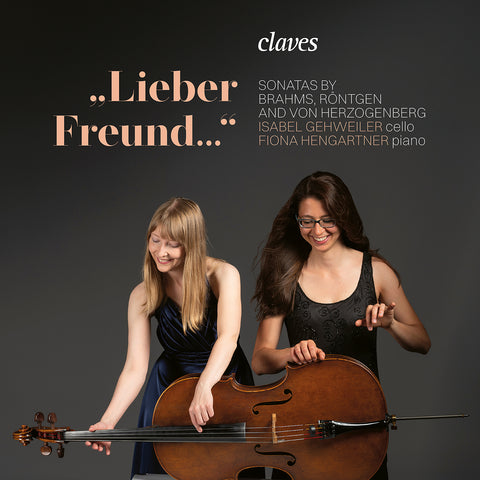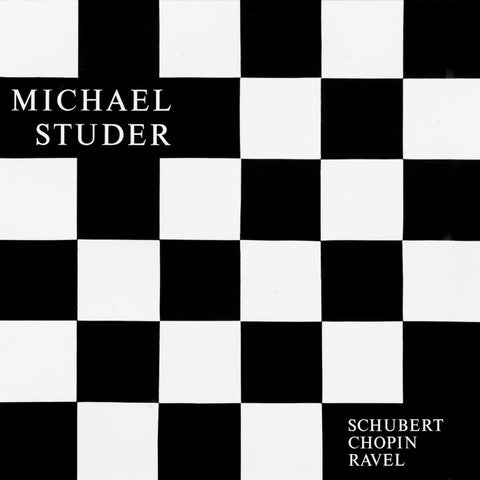(1995) XVIth Clara Haskil Competition 1995 (Live Recording)
Catégorie(s): Concerto Début Piano Raretés
Compositeur principal: Ludwig van Beethoven
Orchestre: Orchestre De Chambre De Lausanne
Nb CD(s): 1
N° de catalogue:
CD 9520
Sortie: 1995
EAN/UPC: 7619931952024
Cet album est en repressage. Précommandez-le dès maintenant à un prix spécial.
CHF 18.50
Cet album n'est plus disponible en CD.
Cet album n'est pas encore sorti. Précommandez-le dès maintenant.
CHF 18.50
Cet album n'est plus disponible en CD.
Cet album n'est plus disponible en CD.
TVA incluse pour la Suisse et l'UE
Frais de port offerts
Cet album est en repressage. Précommandez-le dès maintenant à un prix spécial.
CHF 18.50
Cet album n'est plus disponible en CD.
This album has not been released yet.
Pre-order it at a special price now.
CHF 18.50
Cet album n'est plus disponible en CD.
Cet album n'est plus disponible en CD.
XVITH CLARA HASKIL COMPETITION 1995 (LIVE RECORDING
The Works
The competitors who reached the finals at the Clara Haskil competition had to perform two piano concertos in public accompanied by the Lausanne Chamber Orchestra under the direction of Jesus Lopez-Cobos. These concerts were preceded by a rehearsal and a dress-rehearsal for each concerto. The candidates had their own choice of a concerto by Mozart and a concerto by Beethoven. Prize-Winner Mihaela Ursuleasa briefly explains the reasons for her choices:
“I first played Mozart's Piano Concerto No. 9 ’Jeunehomme’ at the age of ten or eleven. Over the years it has become one of the most frequently performed of his concertos by me. Later I discovered by chance that this was also one of Clara Haskil's favorite concertos, and that made the decision for the competition clear. In addition to this, this work demonstrates the various sides of Mozart's character: the simple, noble nature of the first movement, the distressed soul (void of any mannerisms) in the second movement, and the exuberant, optimistic zest for life in the third movement, which also briefly touches upon the simple, graceful Viennese style in the Minuet.
Ludwig van Beethoven's Piano Concerto No. 5, ‘Emperor', seemed to offer the appropriate contrast to Mozart's concerto since, as its name indicates, it is characterized by a truly ‘majestic' aura. I attempted to display many different musical aspects in my programs during the competition while also trying to build an intensification or crescendo throughout the whole. With this concerto l was able to ‘release' the incredible tension that had built up over the course of the competition while also giving expression to my joy that I had been able to come so far."
Mihaela Ursuleasa (1978-2012)
Mihaela Ursuleasa, born into a family of musicians in Romania in 1978, received her first piano lessons at the age of five and appeared in concert for the first time at the age of eight. She performed Mozart's Piano Concerto in F Major, K. 413, with the Romanian Radio National Orchestra, with whom she later performed Beethoven’s third piano concerto — now available as a live recording.
In 1990 Mihaela Ursuleasa won the third prize at the International Senigallia Competition, appeared with the Orchestra of Radio Italy in Rome, gave two recitals in Tokyo and appeared with the Tokyo Symphony Orchestra. In the same year she also appeared with the Munich Philharmonic Orchestra, performing Mozart s Concerto In flat Major, K. 271.
1990 was an important year for the young pianist in another respect — she played for Claudio Abbado, who was immediately impressed by her talent. Following his advice, she interrupted her blossoming career in order to complete her studies. Since then she has studied with Heinz Medjimorec at the Vienna “Musikhochschule”.
In addition to her studies, Mihaela Ursuleasa has continued concert activities in well measured doses. Recitals in Braunschweig, Frankfurt, Gottingen, Hanover, Rüdesheim, and Wetzlar as well as orchestral concerts in Lausanne, Munich, Toulouse and Vienna have provided excellent opportunities to display her growing repertoire. Mihaela Ursuleasa debuted in Vienna at the "Gesellschaft der Musikfreunde" and also performed for Viennese concert audiences in an orchestral concert: she played Beethoven's third piano concerto accompanied by the Gustav Mahler Youth Orchestra under the direction of Claudio Abbado. That she is on the right path was recently demonstrated by her success at the renowned Clara Haskil Piano Competition: ”Ursuleasa proved once again that artistic maturity has little to do with age. One is an artist, or perhaps better said, one is born an artist — or one is not. Ursuleasa is incontestably an artist. Accompanied with great attention by an Orchestre de Chambre de Lausanne in grand form and superb/y conducted by Jesus Lopez-Cobos, this young woman was completely immersed in the music.
Her pianistic authority, her straightforward, transparent, and (when demanded) energetic style, her sure touch, her stage presence, she is distinguished in all of these elements. Never ceasing to listen to the orchestra, continually encouraging a dialogue, never indifferent or the least bit timid, Mihaela Ursuleasa made one forget that we were assisting at an international piano competition.”
(Le Monde, 5 September 1995)
XVIth Clara Haskil Piano Competition 16 August — 1 September 1995
The Clara Haskil Competition was founded in 1963 in order to honor and perpetuate the memory of the incomparable pianist of Romanian origin. It takes place every two years in Vevey, where Clara Haskil (Bucharest, 1895 — Brussels, 1960) lived from 1942 until her death in 1960 — a street in the town now bears her name. The competition welcomes young pianists (up to a maximum of 30 years of age) from all over the world in pursuit of the timeless musical ideals inspired by Clara Haskil. The competition benefits from the collaboration with Radio Suisse Romande/Espace 2 and the sponsorship of Nestlé SA, the towns of Vevey and Montreux, the communities of Blonay, Chardonne, Corseaux, Corsier, Jongny, La Tour-de-Peilz, Saint-Légier and the support of other companies. The final concert, broadcast by Radio Suisse Romande/Espace 2, is part of the Montreux-Vevey International Music Festival.The competition is held over the course of two weeks and is divided into four rounds: preliminaries, quarter-finals, semi-finals and finals with orchestra. The candidates must perform all works from memory. This year’s illustrious jury was presided by Michel Dalberto (France) and included Bella Davidovich (USA), Akiko Ebi (Japan), Dag Achatz (Sweden), Philippe Dinkel (Switzerland), Nelson Freire (Brazil) and Valentin Gheorghiu (Romania). The jury awards only one prize which cannot be shared.
This disc is the product of a co-production between the Clara Haskil Piano Competition, Radio Suisse Romande/Espace 2 and the Swiss recording company Claves. The radio station furnished recording engineers, studios and the Orchestre de Chambre de Lausanne. The piano concertos were performed within the framework of the competition’s final concert, which was organized by the Montreux-Vevey Music Festival.
(1995) XVIth Clara Haskil Competition 1995 (Live Recording) - CD 9520
The Works
The competitors who reached the finals at the Clara Haskil competition had to perform two piano concertos in public accompanied by the Lausanne Chamber Orchestra under the direction of Jesus Lopez-Cobos. These concerts were preceded by a rehearsal and a dress-rehearsal for each concerto. The candidates had their own choice of a concerto by Mozart and a concerto by Beethoven. Prize-Winner Mihaela Ursuleasa briefly explains the reasons for her choices:
“I first played Mozart's Piano Concerto No. 9 ’Jeunehomme’ at the age of ten or eleven. Over the years it has become one of the most frequently performed of his concertos by me. Later I discovered by chance that this was also one of Clara Haskil's favorite concertos, and that made the decision for the competition clear. In addition to this, this work demonstrates the various sides of Mozart's character: the simple, noble nature of the first movement, the distressed soul (void of any mannerisms) in the second movement, and the exuberant, optimistic zest for life in the third movement, which also briefly touches upon the simple, graceful Viennese style in the Minuet.
Ludwig van Beethoven's Piano Concerto No. 5, ‘Emperor', seemed to offer the appropriate contrast to Mozart's concerto since, as its name indicates, it is characterized by a truly ‘majestic' aura. I attempted to display many different musical aspects in my programs during the competition while also trying to build an intensification or crescendo throughout the whole. With this concerto l was able to ‘release' the incredible tension that had built up over the course of the competition while also giving expression to my joy that I had been able to come so far."
Mihaela Ursuleasa (1978-2012)
Mihaela Ursuleasa, born into a family of musicians in Romania in 1978, received her first piano lessons at the age of five and appeared in concert for the first time at the age of eight. She performed Mozart's Piano Concerto in F Major, K. 413, with the Romanian Radio National Orchestra, with whom she later performed Beethoven’s third piano concerto — now available as a live recording.
In 1990 Mihaela Ursuleasa won the third prize at the International Senigallia Competition, appeared with the Orchestra of Radio Italy in Rome, gave two recitals in Tokyo and appeared with the Tokyo Symphony Orchestra. In the same year she also appeared with the Munich Philharmonic Orchestra, performing Mozart s Concerto In flat Major, K. 271.
1990 was an important year for the young pianist in another respect — she played for Claudio Abbado, who was immediately impressed by her talent. Following his advice, she interrupted her blossoming career in order to complete her studies. Since then she has studied with Heinz Medjimorec at the Vienna “Musikhochschule”.
In addition to her studies, Mihaela Ursuleasa has continued concert activities in well measured doses. Recitals in Braunschweig, Frankfurt, Gottingen, Hanover, Rüdesheim, and Wetzlar as well as orchestral concerts in Lausanne, Munich, Toulouse and Vienna have provided excellent opportunities to display her growing repertoire. Mihaela Ursuleasa debuted in Vienna at the "Gesellschaft der Musikfreunde" and also performed for Viennese concert audiences in an orchestral concert: she played Beethoven's third piano concerto accompanied by the Gustav Mahler Youth Orchestra under the direction of Claudio Abbado. That she is on the right path was recently demonstrated by her success at the renowned Clara Haskil Piano Competition: ”Ursuleasa proved once again that artistic maturity has little to do with age. One is an artist, or perhaps better said, one is born an artist — or one is not. Ursuleasa is incontestably an artist. Accompanied with great attention by an Orchestre de Chambre de Lausanne in grand form and superb/y conducted by Jesus Lopez-Cobos, this young woman was completely immersed in the music.
Her pianistic authority, her straightforward, transparent, and (when demanded) energetic style, her sure touch, her stage presence, she is distinguished in all of these elements. Never ceasing to listen to the orchestra, continually encouraging a dialogue, never indifferent or the least bit timid, Mihaela Ursuleasa made one forget that we were assisting at an international piano competition.”
(Le Monde, 5 September 1995)
XVIth Clara Haskil Piano Competition 16 August — 1 September 1995
The Clara Haskil Competition was founded in 1963 in order to honor and perpetuate the memory of the incomparable pianist of Romanian origin. It takes place every two years in Vevey, where Clara Haskil (Bucharest, 1895 — Brussels, 1960) lived from 1942 until her death in 1960 — a street in the town now bears her name. The competition welcomes young pianists (up to a maximum of 30 years of age) from all over the world in pursuit of the timeless musical ideals inspired by Clara Haskil. The competition benefits from the collaboration with Radio Suisse Romande/Espace 2 and the sponsorship of Nestlé SA, the towns of Vevey and Montreux, the communities of Blonay, Chardonne, Corseaux, Corsier, Jongny, La Tour-de-Peilz, Saint-Légier and the support of other companies. The final concert, broadcast by Radio Suisse Romande/Espace 2, is part of the Montreux-Vevey International Music Festival.The competition is held over the course of two weeks and is divided into four rounds: preliminaries, quarter-finals, semi-finals and finals with orchestra. The candidates must perform all works from memory. This year’s illustrious jury was presided by Michel Dalberto (France) and included Bella Davidovich (USA), Akiko Ebi (Japan), Dag Achatz (Sweden), Philippe Dinkel (Switzerland), Nelson Freire (Brazil) and Valentin Gheorghiu (Romania). The jury awards only one prize which cannot be shared.
This disc is the product of a co-production between the Clara Haskil Piano Competition, Radio Suisse Romande/Espace 2 and the Swiss recording company Claves. The radio station furnished recording engineers, studios and the Orchestre de Chambre de Lausanne. The piano concertos were performed within the framework of the competition’s final concert, which was organized by the Montreux-Vevey Music Festival.
Return to the album | Composer(s): Ludwig van Beethoven | Main Artist: Mihaela Ursuleasa







